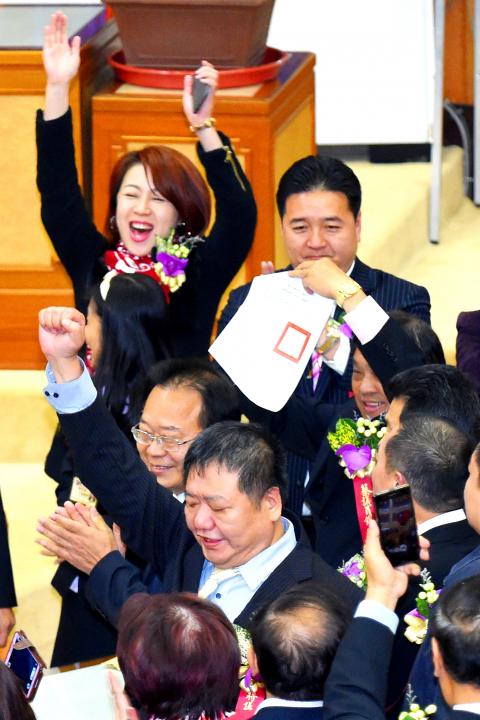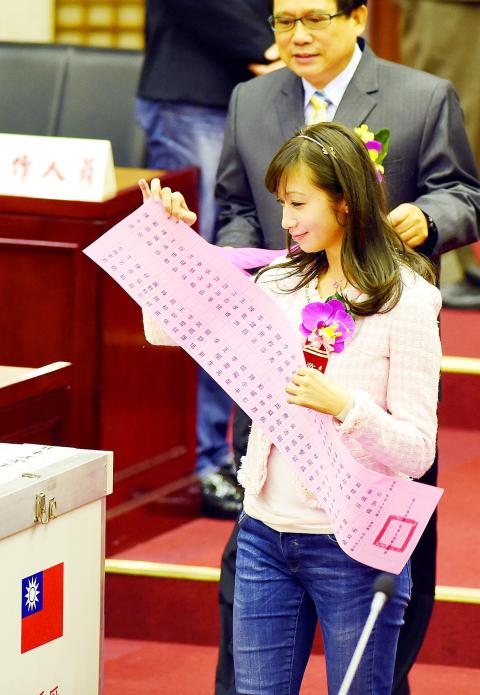On the day of the inauguration of newly elected city, municipality and county heads, 22 councils across the country also voted to choose speakers and deputy speakers.
While the Democratic Progressive Party (DPP) secured the speakers of the Greater Kaohsiung, Yilan County and Chiayi County councils, the Chinese Nationalist Party (KMT) picked up 15, with the remaining four — Hsinchu City, Lienchiang County, Pingtung County and Chiayi City — won by independent councilors.
The Taipei City Council, where the KMT has 28 of the 63 seats and the DPP has 27, is to be presided over by the KMT after the party’s candidate had won by 32 votes to 31 for the DPP’s candidate, while the KMT’s deputy speaker candidate garnered 32 votes to the DPP’s 28.

Photo: Liu Hsin-de, Taipei Times
The New Taipei City Council, which the pan-green camp had expected to win after the DPP threatened to strip the membership of those who did not vote with the party line after 65 years of KMT rule, failed to witness a “color conversion.”
While the DPP has more seats (32) on the New Taipei City Council than the KMT (26), there are seven councilors with no party allegiance and one Taiwan Solidarity Union (TSU) councilor. With TSU Councilor Chang Chin-ting (張晉婷) and a non-affiliated councilor, Chen Shih-rong (陳世榮), being former DPP members, the pan-green camp had expected to have the upper hand in the ballot.
Two rounds of votes, both resulting in a 33-33 tie, were undertaken, before the council finally drew lots, with luck on the side of KMT council speaker candidate Chiang Ken-huang (蔣根煌).

Photo: Liao Chen-huei, Taipei Times
The tie, assuming that all of the DPP councilors toed the party line, indicated that one of the two non-DPP pan-green councilors had not voted as expected.
Chang was rumored to have been the culprit, speculation echoed by DPP Legislator Wu Ping-jui (吳秉叡) and DPP Councilor Liao Hsiao-ching (廖筱清), who directly attributed the loss to the TSU.
The TSU later released a statement saying that the TSU and the DPP had reached a consensus before the vote that the two parties would work together and require their respective party members to toe the party line.
“Following rumors that some [councilors] failed to vote in accordance with party policy, the TSU is to immediately initiate an investigation with the DPP to identify the councilors who breached the agreement and punish them by revoking their party membership,” it said.
Fuming over the outcome of the Tainan City Council vote, the DPP also announced that those who had failed to vote for the party’s own candidates would be severely punished.
To many people’s surprise, the Tainan City Council, where the DPP has a 29-16 advantage over the KMT in terms of seats, selected KMT Councilor Lee Chuan-chiao (李全教) as council speaker, after Lee secured 29 votes to DPP councilor Lai Mei-hui’s (賴美惠) 26.
The DPP said it had expected at least 31 votes, so at least five councilors had not voted as agreed.
DPP Central Review Committee chairman Liu Shih-fang (劉世芳) said that as the party had required all party members to “show their ballots” before putting them in the ballot box as a way to demonstrate their adherence to the party line, “those who failed to do so are seen as the ones who had voted against the party’s candidate and they will face disciplinary action.”
While failing to achieve the expected wins in New Taipei City and Greater Tainan, the DPP did make gains in Greater Kaohsiung and Yilan County, where the party had its speaker candidates elected for the first time in history.
Police installed six surveillance cameras in the Kaohsiung council chamber to monitor the vote and said that those exposing their ballots would be investigated.

AGING: As of last month, people aged 65 or older accounted for 20.06 percent of the total population and the number of couples who got married fell by 18,685 from 2024 Taiwan has surpassed South Korea as the country least willing to have children, with an annual crude birthrate of 4.62 per 1,000 people, Ministry of the Interior data showed yesterday. The nation was previously ranked the second-lowest country in terms of total fertility rate, or the average number of children a woman has in her lifetime. However, South Korea’s fertility rate began to recover from 2023, with total fertility rate rising from 0.72 and estimated to reach 0.82 to 0.85 by last year, and the crude birthrate projected at 6.7 per 1,000 people. Japan’s crude birthrate was projected to fall below six,

US President Donald Trump in an interview with the New York Times published on Thursday said that “it’s up to” Chinese President Xi Jinping (習近平) what China does on Taiwan, but that he would be “very unhappy” with a change in the “status quo.” “He [Xi] considers it to be a part of China, and that’s up to him what he’s going to be doing, but I’ve expressed to him that I would be very unhappy if he did that, and I don’t think he’ll do that. I hope he doesn’t do that,” Trump said. Trump made the comments in the context

SELF-DEFENSE: Tokyo has accelerated its spending goal and its defense minister said the nation needs to discuss whether it should develop nuclear-powered submarines China is ramping up objections to what it sees as Japan’s desire to acquire nuclear weapons, despite Tokyo’s longstanding renunciation of such arms, deepening another fissure in the two neighbors’ increasingly tense ties. In what appears to be a concerted effort, China’s foreign and defense ministries issued statements on Thursday condemning alleged remilitarism efforts by Tokyo. The remarks came as two of the country’s top think tanks jointly issued a 29-page report framing actions by “right-wing forces” in Japan as posing a “serious threat” to world peace. While that report did not define “right-wing forces,” the Chinese Ministry of Foreign Affairs was

PREPAREDNESS: Given the difficulty of importing ammunition during wartime, the Ministry of National Defense said it would prioritize ‘coproduction’ partnerships A newly formed unit of the Marine Corps tasked with land-based security operations has recently replaced its aging, domestically produced rifles with more advanced, US-made M4A1 rifles, a source said yesterday. The unnamed source familiar with the matter said the First Security Battalion of the Marine Corps’ Air Defense and Base Guard Group has replaced its older T65K2 rifles, which have been in service since the late 1980s, with the newly received M4A1s. The source did not say exactly when the upgrade took place or how many M4A1s were issued to the battalion. The confirmation came after Chinese-language media reported